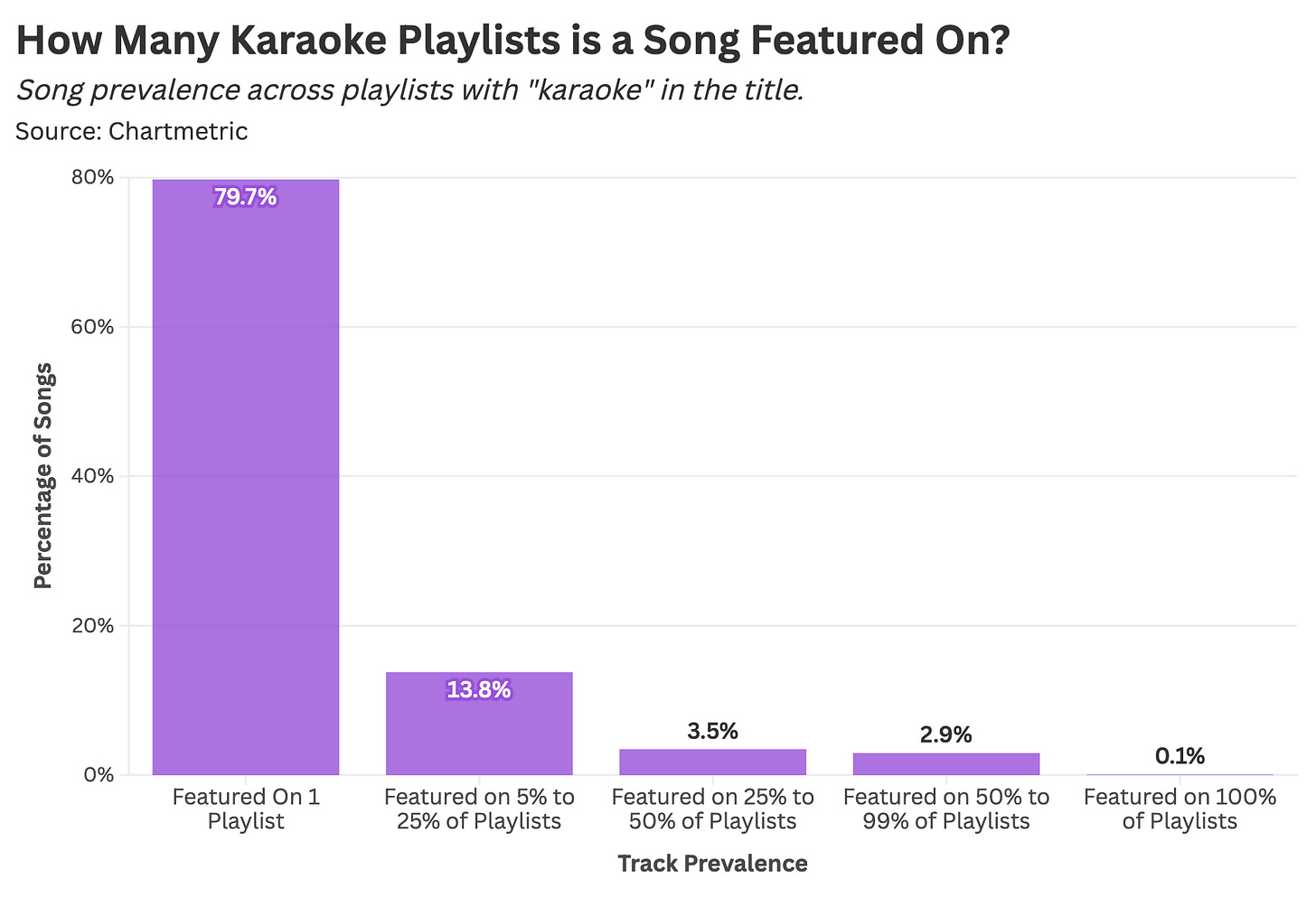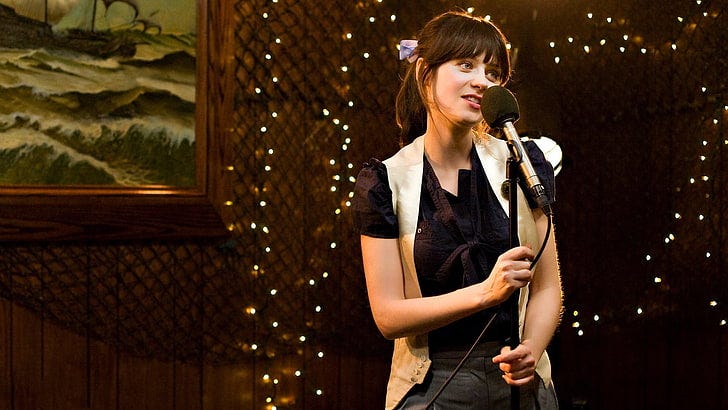What Are the Greatest Karaoke Songs of All Time? A Statistical Analysis
Which songs dominate karaoke night?
Intro: Karaoke and the Gift of "Social Harmony"
Karaoke emerged in Japan in the early 1970s, its name blending the words "kara" (meaning "empty") and "oke" (short for "orchestra")—thus translating to "empty orchestra." The invention of karaoke is often credited to Daisuke Inoue, a Japanese drummer who created the first karaoke machine in 1971. Crucially, Inoue did not patent his invention, which contributed to its rapid proliferation.
Karaoke quickly spread throughout Asia during the 1970s and reached the West in the mid-1980s, benefiting from innovations like CDs, consumer karaoke boxes, and private karaoke rooms. In 2004, Daisuke Inoue was awarded the Ig Nobel Prize (which honors offbeat achievements) for "fostering social harmony" through his invention.
In the early 2010s, I did karaoke for the first time and, subsequently, had my mind blown—experiencing a newfound level of social harmony (and inebriation) I'd never felt before. My verdict: Daisuke Inoue fully earned his Ig Nobel Prize.
Once a modest diversion in sloppy dive bars, the karaoke industry is estimated at $5.5B worldwide and continues to grow as people seek communal experiences to supplement their increasingly digital lives. When one walks into a karaoke bar, they are presented with a thick binder featuring thousands of empty orchestral tunes, granting patrons near-limitless song selection. And yet, despite this sprawling songbook, almost every karaoke night gravitates toward a familiar roster of timeless crowd-pleasers.
So today, we'll explore the most frequently selected karaoke songs, the commonalities among these staples, and the musical eras celebrated by this pastime.
What Are The Greatest Karaoke Songs of All Time?
Every month, Google logs over 29 million queries related to "karaoke"—whether that be searches for "karaoke near me" or sing-along tracks on YouTube. Global searches for quirky instrumental covers of popular tunes far exceed the Google traffic commanded by pop juggernauts like Beyoncé, Taylor Swift, and Lady Gaga (who produce songs with actual words).
So, which tracks are the focal point of these karaoke-centric Google searches?
To curate the ultimate karaoke canon, I pulled track data from widely followed "karaoke" playlists on Spotify and Apple Music, then tallied how often each song and artist appeared across our combined catalog.
If you walk past a karaoke bar at 10 pm on a Friday, there is a ~50% chance that someone is shrilly shrieking "I Want It That Way" by The Backstreet Boys—a totally made-up statistic supported by this song's appearance on every playlist in our dataset.
The rest of our karaoke canon is headlined by a list of wedding and Bar Mitzvah classics, including "I Want to Dance With Somebody," "Wannabe," and "(Hit Me)...Baby One More Time."
The Backstreet Boys also top our list of artists with the most tracks in our composite playlist, with "Everybody (Backstreet's Back)" and "As Long As You Love Me" making frequent appearances.
Two trends stand out about this roster of musicians:
Surprising Musical Diversity: These acts span numerous decades and genres, reflecting the eclectic tastes of modern karaoke consumers.
Low Prevalence of Frequently Featured Acts: Collectively, our ten most-played artists account for less than eight percent of tracks in our expanded playlist, indicating a vast catalog of popular karaoke songs.
So, how quantifiably diverse are karaoke tastes, and do these selections cluster around particular eras of music?
Enjoying the article thus far and want more data-centric pop culture content?
How Diverse Are Karaoke Tastes?
Part of the fun of karaoke is that you can "choose your own adventure." For example, my favorite sing-along songs are pop punk staples from the early 2000s (i.e., Blink-182, Green Day, and My Chemical Romance), while one of my friends insists on singing Creed's "One Last Breath" as a running bit (that is not funny, and—because of how not funny it is—has become extremely funny). Somehow, he found this song in a karaoke catalog in rural Austria, introducing a bar of unsuspecting Austrians to a new level of sonic torture.
None of my preferred acts (or Creed) are represented amongst our group of heavily imitated artists, underscoring how karaoke song selection is driven by a long tail of deeply personal picks.
Across our consolidated dataset:
Nearly 80% of tracks are featured on a single playlist.
Meanwhile, a mere 3% of songs appear on +50% of playlists.
Put simply, the pool of tunes considered karaoke-worthy is expansive (at least, according to playlist creators).
Karaoke is like The Cheesecake Factory—the menu is massive, allowing everyone to get exactly what they want (whether that be egg rolls and chicken parmesan, or Elton John and Creed).
So, does this mean karaoke staples span every era with no decade dominating our collective tastes? Not exactly.
When we tabulate playlist selections by decade, we find that the 1990s and 2000s are heavily featured across our combined set of tracks.
My best guess is that this clustering stems from two distinct phenomena:
Nostalgia: People like to sing the songs of their youth (such as pop punk staples from the early 2000s). Perhaps the prototypical karaoke customer is aged 25 to 45 and thus demands ample Britney Spears, Backstreet Boys, and Spice Girls to satisfy their childhood proclivities.
The Decline of Monoculture: The 1990s and 2000s were the last decades before the rise of streaming. In this pre-streaming era, radio airplay and MTV countdowns shaped the zeitgeist, homogenizing tastes and generating a larger pool of songs for karaoke celebrations.
Maybe 20 years from now, this chart will be packed with hits from the 2020s—or maybe our tastes will stay frozen in amber, meaning "I Want It That Way" will reign as karaoke's eternal anthem.
Final Thoughts: You Are Your Favorite Song
There is something deeply personal about someone's go-to karaoke song. In my opinion, this detail tells you more about a person than countless hours of small talk. For example, I have a distant relative (by marriage) who is typically quiet at family gatherings; therefore, I don't know much about her. However, she once volunteered an extremely crucial piece of information about herself: her favorite karaoke track is "What's Up" by 4-Non Blondes.
If you're familiar with this song (and most people will be after listening to its iconic chorus), you'll note that this tune requires incredible vocal commitment from its singer (which one might call "near-screaming"). Even in my wildest dreams, I'd never dare attempt this song—I'm certain I'd sound ridiculous. And yet, this was the go-to karaoke selection for my soft-spoken family member.
Whenever I think of this person, her love of "What's Up" is the first detail that comes to mind—a defining trait so vivid it shapes my entire perception of who they are. I'd give anything to be in the same karaoke room when this track hits—to see her absent inhibition.
Post-pandemic, culture is increasingly consumed in silos. Music and movie streaming offer greater personalization and convenience at the expense of shared experience.
Sure, karaoke may seem like a frivolous pastime—the province of drunk people in sweaty bars—but it's also one of the few remaining rituals in which people celebrate culture together, revealing bits of themselves and what they love. I don't know about you, but I think this feat is worthy of an (Ig) Nobel Prize—even if it means the world must endure a little more Creed.
Struggling With a Data Problem? Stat Significant Can Help!
Having trouble extracting insights from your data? Need assistance on a data or research project? Well, you’re in luck because Stat Significant offers data consulting services and can help with:
Insights: Unlock actionable insights from your data with customized analyses that drive strategic growth and help you make informed decisions.
Dashboard-Building: Transform your data into clear, compelling dashboards that deliver real-time insights.
Data Architecture: Make your existing data usable through extraction, cleaning, transformation, and the creation of data pipelines.
Want to chat? Drop me an email at daniel@statsignificant.com, connect with me on LinkedIn, reply to this email, or book a free data consultation at the link below.
Want to chat about data and statistics? Have an interesting data project? Looking to produce data-centric editorial content? Email daniel@statsignificant.com










Reunited love will keep us together I got you babe ur all I need to get by wit u im born again cruising
what about an…international perspective?